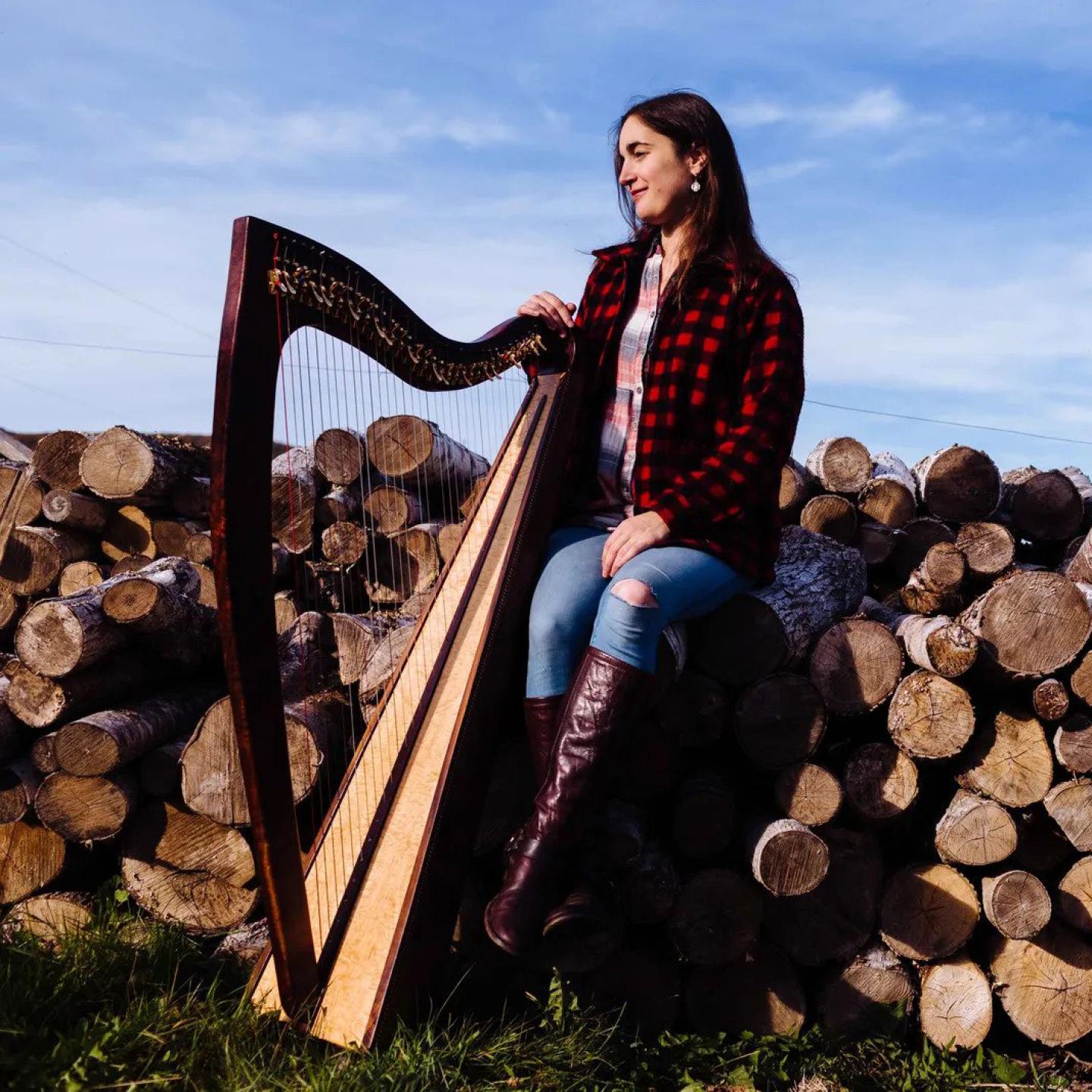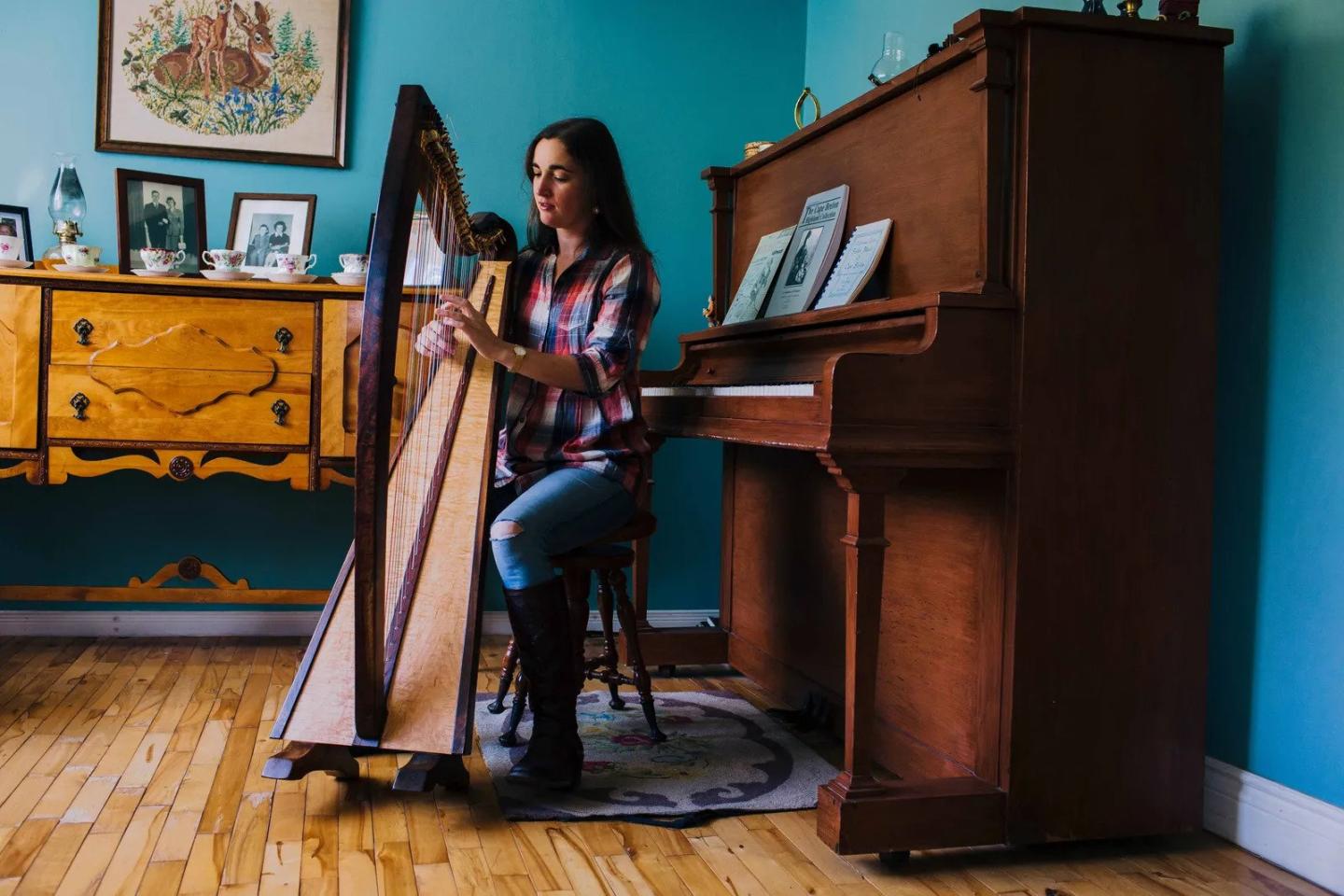“When you start getting into traditional music of any kind, it is inseparable from not only the instruments of that culture, but also the songs and the storytelling and the history. In each person, there’s this idea of being a tradition bearer, somebody who contains in their mind and in their practice a large body of music or style or even stories, who is capable of transmitting that to younger generations. It’s very important that it doesn’t exist only on the page, but that it exists in a living, breathing human.”
Harmonious Heritage
Dominique Dodge ’01 finds joy in participating in the revival of the language tied to the music she loves.
BY JANA F. BROWN
It’s not often that someone discovers their purpose in life prior to adulthood.
“I found the harp when I was about 12,” Dominique Dodge ’01 says, “and I knew immediately when I sat down with that instrument that this was what I wanted to do for the rest of my life.”
Two decades removed from her graduation from St. Paul’s School, Dodge has returned to her hometown of Jackson, New Hampshire, where she lives with her partner, Erik Koeppel. He is a landscape painter and leader in the revival of the techniques of the Hudson River School, while Dodge makes her living as a performer, recording artist, and teacher, maintaining a vibrant online studio that serves a community of more than 60 students. Together, the couple keeps a flock of chickens and grows many of their own vegetables on their rural homestead.
Just prior to the pandemic, Dodge released an album — Cànan nan Teud (“The Language of the Strings”). Before everything changed, she had planned a tour of festivals, house concerts, and halls to share the music in the way it was meant to be shared — through a series of live performances. The nine-track album was recorded in Cape Breton, Nova Scotia, Dodge’s second home and the place where she fell in love with traditional Scottish and Irish music. The album was a decade in the making and a perfect confluence of Dodge’s respect for the full context of the music she loves. In addition to the singing and harp playing of Dodge, the album features a percussive dancer, two fiddlers, and a group of local Gaelic singers. Dodge wrote the album’s sleeve notes in Gaelic and then translated them back into English, a nod to the language that inspired her work. She also researched archival songs with roots in Cape Breton.
“I actually became fluent in Gaelic as part of that project and, in the process, made something I was extremely proud of,” says Dodge, who also recently learned to play the concertina, a portable hexagonal cousin of the accordion. “It’s really sort of a love story for Cape Breton, and I did a tremendous amount of scholarship on this album in addition to a lot of musicianship.”
COVID-19 hit soon after the album was launched at Cape Breton’s Celtic Colours International Festival. As it turns out, the pandemic opened up a new world for Dodge’s other passion — teaching. Rather than devoting her time to guiding a handful of local students who were accessible in person, she started offering private and group lessons online and was soon teaching students from New England, New Zealand, Italy and Japan, time zones be damned.
As a student at St. Paul’s, Dodge felt fully supported by the School as the music program paid her Jackson-based harp teacher, Jane Hively, to travel to Concord weekly to continue lessons. When the two determined that an instructor trained in Scottish or Irish music would help Dodge get to the next level in her development, St. Paul’s hired a teacher named Mary Graham to continue Dodge’s musical education.

“St. Paul’s was incredible in finding me teachers and making sure I could continue the thing I loved most. It was really important to have that year with Mary before I came into my work at the Royal Scottish Academy of Music and Drama. If I didn’t have that support and training, I don’t know that I could have gotten into an incredibly competitive degree where there’s only one spot for my instrument — and that spot usually does not go to an American.”
Since earning her B.A. in Scottish music from what is now known as the Royal Conservatoire of Scotland, Dodge received a 2012 Fulbright Scholarship to go to Ireland to pursue a master’s in Irish music performance at the University of Limerick. Afterward, she spent a few years living on a farm in Cape Breton, honing her musical talent and studying Scottish Gaelic, which inspired Dodge to pursue an additional B.A. through the medium of Gaelic online at Sabhal Mòr Ostaig, the Gaelic College on Scotland’s Isle of Skye. She has a 20-year vision that includes both an M.A. and a Ph.D. in the field.
Dodge finds particular joy in participating in the revival of a language spoken by only about 60,000 people. Scottish Gaelic, she says, is inextricably linked with the music to which she has devoted her life. Living among those who not only speak the language, but carry the traditions throughout their lives, has informed Dodge’s own teaching. In addition to sharing the music, she also makes sure her students understand the culture and context from which it arises.

At 12, Dodge found the harp, the instrument that launched her on the path to being a dedicated student of traditional music, sent her to Europe and Canada to discover the roots of her passion, and has resulted in a lifelong devotion to educating herself and others on the traditions of Scottish and Irish music and culture. What she does today extends far beyond her initial affinity for the harp; her purpose continues to evolve and deepen.
“When I was a child and I sat down at the harp,” she says, “it just made perfect sense to me. Today, I consider myself very much a traditional musician who happens to play the harp, rather than the other way around. My priorities are very strongly wanting to see this music and this language and this culture thrive where it exists. I want to see it passed down to multiple generations of people.”